Staff Inquiry: Films We’re Embarrassed To Have Once Called Our Favorites
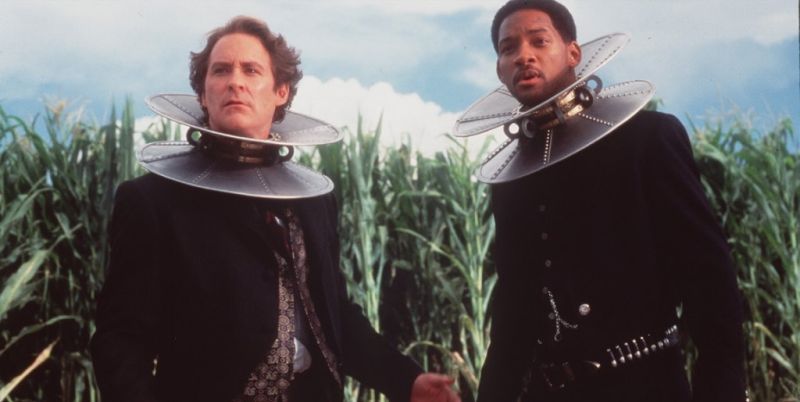
Arlin is an all-around film person in Oakland, CA. He…
Taste is a fluid thing, though we seldom view it as such in the moment. For many, our cultural tastes define us and they are as solid and inscrutable as a pope made out of granite. Yet this is something that is often felt even bereft of the experience required to discover, explore and refine what kinds of cinema to which one really responds. Consequently, we may vehemently vouch for a film based on an incomplete set of values and understanding about the world, only years later recognizing our juvenile lack of critical thought.
If there was a graph for the following group of films, it might look something like this:
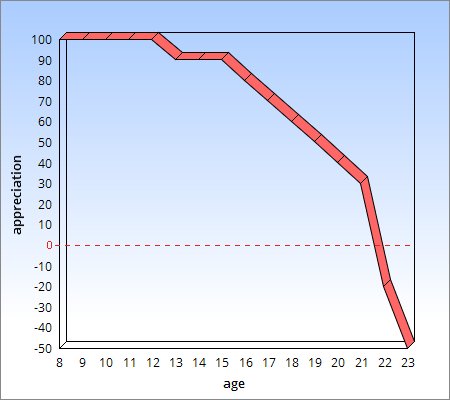
Some of us still keep these films in high enough regard to hold somewhere above that dotted red line, but by and large these films are ones we are embarrassed to have once claimed as our favorites.
Alex Lines – Wild Wild West (1999)
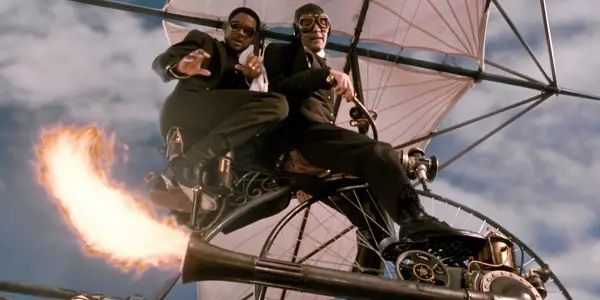
Dir. Barry Sonnenfeld
Boy, did I have awful film tastes as a kid. If you went back in time and found young Alex and asked what his favourite films were, I’d answer – Mystery Men (which I still love), Godzilla (the Roland Emmerich one) and Wild Wild West. As I’ve gotten older and watched a ton of films, a re-watch in my teenage years served a cold reminder of the power of nostalgia. The film I once looked at in wonder, I was now watching in complete confusion; a completely misguided, erratic blockbuster that is the epitome of all the problems that plagued mainstream films of the 90’s and why independent cinema was slowly gaining the upper hand.
A loose adaptation of the 1960’s Western serial of the same name, Wild Wild West follows the adventures of James West (Will Smith, at the peak of his stardom), an army captain and wise cracking sheriff who teams up with US Marshal Artemus Gordon (Kevin Kline, who saves the film) to stop the treasonous plot by the maniacal Dr. Arliss Loveless (a scene-chewing Kenneth Branagh), who plans to take over America…with a giant mechanical spider.
The films many problems are ones common with 90’s mainstream films but on such a higher level, these elements include: adapting an obscure property (other examples include Beverly Hillbillies, Dragnet, Mr. Magoo, The Avengers and more), unnecessarily giant budgets ($170 million in 1999 and that’s without the extravagant marketing costs), aggressive, highly exposed marketing (the famous tie-in song, the many award show performances, the high trailer rotation the film promoted at the time) and the need for mainstream films to try to replicate the techniques being experimented with in the rising independent cinema scene. Wild Wild West is a bad film because it feels like a product, rather than a film. The film is split on being a hip, cool Will Smith vehicle, an adult steampunk adventure and a family friendly Western film.
This split can be seen in the film’s frequent sexual references (Loveless makes a very clear reference to building a giant dildo), the casual racism (James West frequently is insulted due to his race and receives some slave-themed insults), the surprising violence (beheadings, people being crushed to death) the nudity (Smith and then newcomer Salma Hayek both show skin in a film intended for young adults) and most of all, the film’s complete bonkers script.
It’s not an idea that looked good on paper, it feels like a film rushed out to capitalize on Will Smith’s erupting box office power, filled with erratic tone shifts and CGI which has not aged that well as well. It’s not completely horrible, it’s just completely nuts in a mostly uninteresting way, a time capsule for the delirious evolution that cinema was going through in the 90’s.
Julia Smith – Twister (1996)
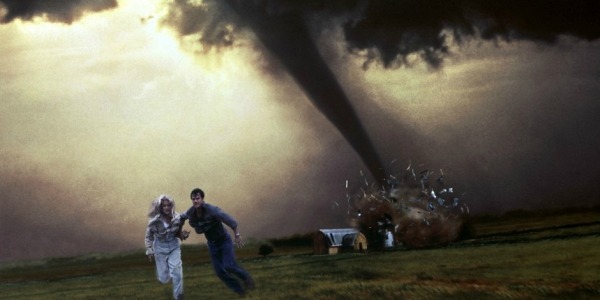
Dir. Jan de Bont
Like for most people my defining year was the one when I turned fourteen. Maybe because of that, or because they were just awesome, 90’s films still continue to bring me a great amount of joy. However, the one that will always hold a special place in my heart is 1996’s Twister. Twister set the parameters for everything I would love about film. Or if it didn’t set them, it comprised of what I’ve only just realised, at the age of thirty-three, are my favourite film elements. A smart badass woman, a narrative set over twenty-four hours, a well-thought-out script, maybe a bit of science, with some drama, romance and comedy thrown in for good measure.
Dr. Jo Harding, the confident, smart, tortured genius was and continues to be a heroine of mine. She was creative, dynamic, but more than that she had a lot of love for her friends, colleagues and her soon to be ex-husband Bill. For those who don’t know, the film is set over a twenty-four hour period in which Jo attempts to send a piece of weather recording equipment into the heart of a tornado. She draws in her husband (and his fiancée), appealing to his passion for their project. What happens next is a wild, chaotic series of events that sees them get tossed around by a record-breaking number of tornadoes. While it’s your formulaic action movie, it’s got plenty of heart and actual science thrown in to the mix to make it more believable than most.
Helen Hunt is superb as Jo Harding, she is deep and sincere and wily. And I have always wanted to have the confidence that she exudes. Man she’s awesome! The supporting cast is superb, and Michael Crichton and Anne-Marie Martin’s script is the perfect mix of science and drama and romance. Jan De Bont pulls it all off with a frenetic style that made Speed equally as awesome. Plus, the soundtrack to Twister is superb.
I have no guilty pleasures. Twister was my favourite film when I was fourteen and continues to be one of my favourites today, only entering into a hierarchy because of the sheer amount of films I’ve watched since then. I started studying film when I was sixteen, and Twister has stayed with me through every screen reading of Citizen Kane and every analysis of Bernard Herrmann’s Psycho theme. Twister is fast, fun, tenacious, and I love every single second of it.
Alistair Ryder – Borat (2006)
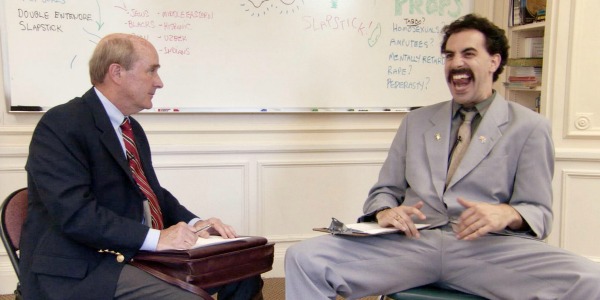
Dir. Larry Charles
Although it would be easy for this challenge to name any number of films I enjoyed as a kid that nostalgic repeat viewings uncover to have been awful all along (Jimmy Neutron: Boy Genius, I’m looking at you), it feels almost like a cheat. There has been plenty of questionable content I have enjoyed whilst developing the more cynical viewing capacities of a jaded cinephile, none more questionable than Borat.
When I saw Borat for the first time, I was twelve years old; smart enough to get the social satire, but far more entertained by the ridiculous gross-out humour. In retrospect, this was the perfect age to see it – many of Borat’s quotes and catchphrases, so instantly ubiquitous and annoying in pop-culture, are easily quotable in the playground. Is there anything more thrilling as a kid than being subjected to films featuring content so offensive and “shocking”, repeating the experience with your friends by doing bad impressions of the phrase “my wife?”
But as recent cinematic travesty The Brothers Grimsby attested, Sacha Baron Cohen and his brand of social satire are a dated cultural force, tone-deaf at making social statements and with more than a whiff of trying too hard. All it shows is that the theme of “punching down” at lower class people so inherent in his latest effort isn’t novel for him – it’s been there all along. With Trump-mania mournfully engulfing middle America, the prejudicial statements made by many of the real-life figures onscreen in Borat should continue to be shocking retroactively.
But the fact Cohen is using a lazy cultural stereotype (one that he helped reinforce, no less) to gouge these statements from people reduces any form of satirical punch. It’s punching down in order to punch up. The poverty-stricken streets of Kazakhstan are an Eastern European variation on the streets of Grimsby in his latest effort. It’s safe to assume that as a private-schooled, Oxbridge educated, multi-millionaire celebrity, he finds poverty inherently hilarious. No matter how brave Cohen was in the process of making the film, it still represents satire at its laziest.
Arlin Golden – Terror Firmer (1999)

Dir. Lloyd Kauffman
As a youth, I had a few wayward years where my behavior may have been politely described as “outlandish”. During this time, it was my habit while biking home from school on Tuesdays to stop at Video Update, one of several local video stores, as they had a two film for .99 cent deal. For a latch-key 12-year-old, there was no better way to zip through the canonical horror franchises at a break-neck pace, before returning the whole set and doing it all over again the next Tuesday. But watching horror at this pace one exhausts quickly Freddy, Michael and Jason, and their tolerance for gore is likely to increase as well. It is this combination of forced obscurity and desensitization that led me to Troma films.
Troma is a producer of independent films based in New York City that rose to prominence in the 80’s with the eco-horror-action-comedy The Toxic Avenger. Building on that character, studio founders Lloyd Kauffman and Michael Herz created a cinematic universe all their own years before it was common practice in Hollywood. The motifs that mark Troma films are excessive gore and nudity, a metal soundtrack, some creative practical effects and a fierce independent spirit; kind of like Russ Meyers meets Roger Corman, taken to their logical extremes.
I’d like to say that it was probably that last bit, coupled with all the supplementary material that made up this unique and idiosyncratic universe, that drew me in. But if I’m being honest the consistent aspects of Troma films are everything in which an unsupervised pubescent boy would be interested.
Terror Firmer was the film the studio was just releasing and heavily promoting as I began to explore the world of Troma, so I ended up claiming it as my favorite. The film, co-penned by a young James Gunn, concerns a troubled production helmed by a blind director (Kauffman) that happens to be stalked by a murderous, transsexual serial killer. So basically it’s like 8 1/2 , but with more blood and micro-penises.
As the years went on and my height surpassed six feet, my time wandering the video aisles had led to different kinds of films altogether, until I wasn’t keeping up with Troma at all. I wouldn’t say that their films began to offend me, or that I felt their vulgarity to be beneath me, but just that I had evolved away from blood and boobs being the chief motivating factors for my liking a movie. No doubt part of my desire for the weird and independent was instigated by Troma, and there will always be a part of me of that fondly recalls my time as a Tromaniac, but it’s a part that no longer sees much daylight.
Becky Kukla – Grease (1978)

Dir. Randal Kleiser
When I was about eight years old, my Dad introduced me to Grease. I was captivated, enthralled, overjoyed and wondered how I had lived my short life until that moment with Danny, Sandy and the rest of Rydell High not being a part of it. My weeks and days were filled with singing (personal favourite was ‘Sandra-Dee’) and dancing around our living room to “We Go Together”. As I got older, I grew to love it even more.
The appeal of Grease, I mused to myself at the age of sixteen, is that it is utterly timeless. It transcends generations, because it taps into the part of growing up which everyone experiences. Your first love. It has catchy songs, fantastic dance numbers and incredibly quotable lines. Even as I got older, I still respected the film as a piece of iconic cinema – funny, sad and above all a timeless love story.
That is, until I began my foray into the world of film studies and started to broaden my horizons. Not only in terms of the films I watched (they were now no longer American-centric or full of conventional love stories) but also in terms of representation in cinema. I started reading Mulvey, Butler and Kaplan. At the same time, my understanding of relationships began to change and the fantasy love story which many young women had grown up with shifted, and fell away from us. In short, my way of thinking changed.
Subtly, but enough to be absolutely horrified by Grease the next time I watched it. The loud and clear message I was receiving from my former favourite film was this: if you want a guy to be interested in you, change. I recoiled. Surely this was wrong? Surely, there was a mistake? Danny and Sandy are in love. Everyone is happy! They are so happy, they fly off in a car before breaking the fourth wall right at the end!
What eleven year old me had seen as camaraderie, friendship and loving relationship was now abusive bullying, slut-shaming and Sandy changing every aspect of her life for Danny. No doubt the cars are still cool, but I’ll never endorse Grease as a good film (or my favourite film) ever again. Though I’ve heard Grease 2 is supposed to be okay…right?
Alexander Miller – Fear and Loathing in Las Vegas (1998)
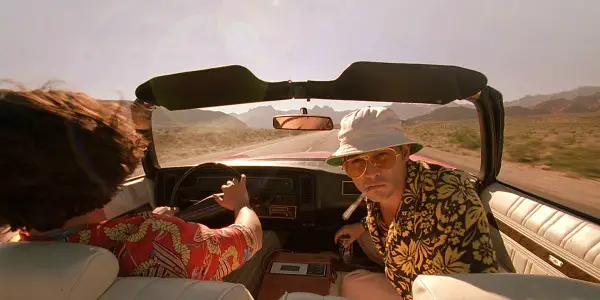
Dir. Terry Gilliam
Outgrowing something is always a bittersweet experience, even when it comes to movies. In some way or another I’m sure we can all relate to the c*ckiness of youth; and there’s always that “brainy” phase that’s like puberty’s afterthought. This jump started a nose dive into literature and of course my well intended angst gravitated toward the whole beat generation; sure Jack Kerouac was cool but the unkempt lunacy that followed the beat generation was Hunter S. Thompson and in my mind he was god like.
Naturally this meant that my hands down favorite movie was Fear and Loathing in Las Vegas; it’s a very busy film, and the hallucinatory drug-fueled lunacy quenched my thirsty young mind. After hearing, “the book is better than the movie” countless times Fear and Loathing in Las Vegas arrived like a godsend. Terry Gilliam had not only made a superior adaptation, but he put one of my all time favorite books on screen. Love of the movie was further buttressed by the (at the time) new Criterion DVD which was mind-blowingly loaded with bonus features; it was also my introduction to the Criterion Collection, so, thanks, Terry. This movie was in regular rotation at social gatherings and parties, it seemed like Fear and Loathing in Las Vegas could never get old.
Ironically enough it never did, but with the advantage of hindsight and a wee bit of maturity you learn that drugs aren’t cool, neither is reckless behavior, and Hunter Thompson was kind of a jerk. While I still admire the Duke of Gonzo and his many great works, Fear and Loathing in Las Vegas is a film that is a part of my past. Terry Gilliam, Jonny Depp, Benicio Del Toro, and Hunter Thompson collectively made a darkly comic odyssey that’s probably one of the better book to screen adaptations, and probably one of the few movies to feature a reptile orgy. I still have that Criterion double-disc DVD of Fear and Loathing, I might pop it in for nostalgia, or maybe down the road I’ll have one of those The Big Chill reunions (without the whole suicide thing) , and it’ll be required viewing.
Jay Ledbetter – Timeline (2003)
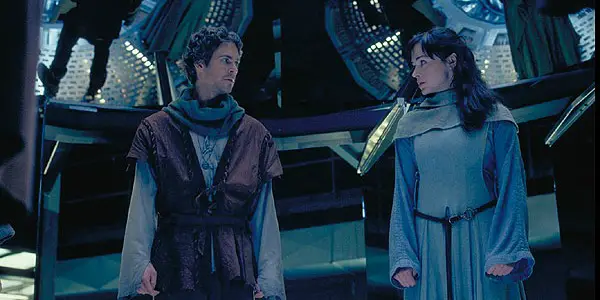
Dr. Richard Donner
I hold myself in high regard for thinking that the Star Wars prequels were bad the very first time I saw it. Even when I was 10 years old I couldn’t handle the idiocy that was Jar-Jar F’in Binks. But, alas, we cannot be immune to all bad films. Take, for example, a time travel epic starring Paul Walker as a fledgling archaeologist based on a Michael Crichton novel. 12-year-old me loved anything related to medieval times. Knights, kings, nobility, all that jazz. Add in that I had been reading a lot of the essential Crichton around that time and I was absolutely sold. There was exactly zero chance I wasn’t going to love Timeline in 2003.
I was giddy with excitement. Today, it is a complete afterthought of a film. Turn to the person to your left and they will look at you blankly if you bring it up. But when I saw it the first time, it absolutely blew me away.
I didn’t think anyone could be any cooler than Paul Walker was in the film. In my mind, his character was the new Indiana Jones (which was my favorite film growing up, and continues to be one of my favorites today). I later discovered that it was directed by Richard Donner, whose name meant absolutely nothing to me in 2003. The film doesn’t have that Donner charm that he became well-known for over the previous two-and-a-half decades, and that prevents it from being anything more than average at times, downright bad at others.
It isn’t the complete disaster that the critical reception and box-office results would imply, though. Any time you get to see Billy Connolly doing zany Scottish stuff you never feel that your time wasted and there are some decent set pieces, but it mostly falls flat. This was Paul Walker’s chance to prove he could be a truly bankable movie star and he performed exactly as you would expect him to. If I had a time machine like Walker’s, I wouldn’t go back to medieval times, I would go back to’03 and warn myself that loving Timeline will only disappoint in the long run.
Manon de Reeper – Swordfish (2001)
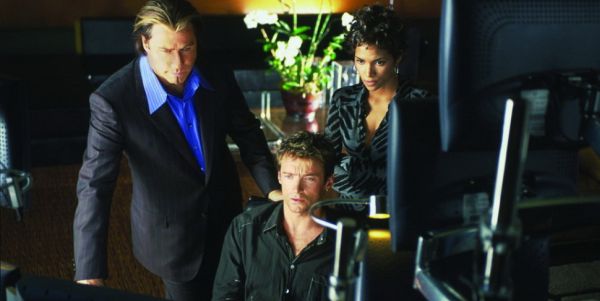
Swordfish is a film directed by Dominic Sena, who was very hot in the early 00’s but hasn’t done much since – he also directed my younger brother’s favorite film at the time, Gone in Sixty Seconds (I didn’t care for that one, though – I never really felt the Cage). Swordfish stars John Travolta (just as he began messing with his face), the fresh Hollywood import Hugh Jackman and a topless Halle Berry. Or Hail Berry, as I’d pronounce her name back then.
Swordfish, I’m afraid to say, was one of my favorite films for a long time. I realise now that at the time of release of this film I was only 11 years old, which was probably a bit young to be watching R-rated films, but hey, we Dutch don’t care much for censorship. Plus, my dad was a huge (action) movie buff and he wasn’t gonna let some kids stop him from watching his movies.
Swordfish, a movie distinctly not about swordfish, is about an ex-convict hacker Stanley (Jackman), who only wants to be reunited with his kid Holly, but his bitchy porn star ex-wife wouldn’t allow it. He’s soon recruited by the suave counter-terrorism group leader Gabriel Shear (played by Travolta, who drove an awesome TVR) who offers him $10m for Stanley to siphon billions out of government slush funds. His job interview involved hacking a secure government server while getting a blow j*b. I’m sure this convinced many young boys to go into IT, only to be very disappointed. Oh man, this was such a trashy film!
Swordfish’ ending is one of the most convoluted endings in cinema history – a film with as many red herrings as there are bad jokes in Alistair’s pick, Borat. Is Gabriel dead, or is he not dead? Is he a terrorist himself, or is he saving the world? And what about Ginger, Berry’s character – was she a bad-ass undercover DEA agent, or a terrorist? Or was she merely the hot girlfriend who was in on the plot? Or do we really not know who they are, at all? MYSTERY! Excitement! So many riddles – I loved it! Admittedly, I always loved puzzles.
I think the many flashy action scenes (cars, boats, helicopters – they all blow up!), the grand hacking scenes (no one needs 12 giant, blinking screens to hack a server, guys) and fast action-y editing of the film fooled my then still susceptible mind, because as I rewatched this film countless times, I never truly uncovered who was who, and what was what. And nowadays, I think it was purely due to its poorly written, mess of a script and not because of my below average intelligence – alas, it was only years later that I finally settled on that conclusion.
Though we may lament our prior errors in cinematic judgement, they were no doubt an essential part in the formation of our personal tastes; for knowing that what worked for you in the past works no longer is a key component of knowing what works for you in the present. Taste is just about the most subjective aspect of humanity, so much so that, as evidenced in the preceding assortment of films, subjectivities can clash within the same person.
The fluidity of personal taste also serves to remind us of the fluidity of any other number of things we might consider otherwise to be static. Societal norms, taboos, even history are all constantly changing and being reformed by those in positions to do so. Little, if anything, is truly concrete, sidewalks and statues included. As we inevitably bumble into the future of filmmaking and watching, we would do well when making proclamations on the merits of a film to take a moment to remember those made previously. If you find that you would no longer make such a sweeping declaration, as was the case with this group of films, perhaps you might want to reconsider your stance on doing so now.
What are the skeletons in your cinematic closet?
Does content like this matter to you?
Become a Member and support film journalism. Unlock access to all of Film Inquiry`s great articles. Join a community of like-minded readers who are passionate about cinema - get access to our private members Network, give back to independent filmmakers, and more.
Arlin is an all-around film person in Oakland, CA. He received his BA in Film Studies in 2010, is a documentary distributor and filmmaker, and runs Drunken Film Fest Oakland. He rarely dreams, but the most frequent ones are the ones where it's finals and he hasn't been to class all semester. He hopes one day that the world recognizes the many values of the siesta system.












